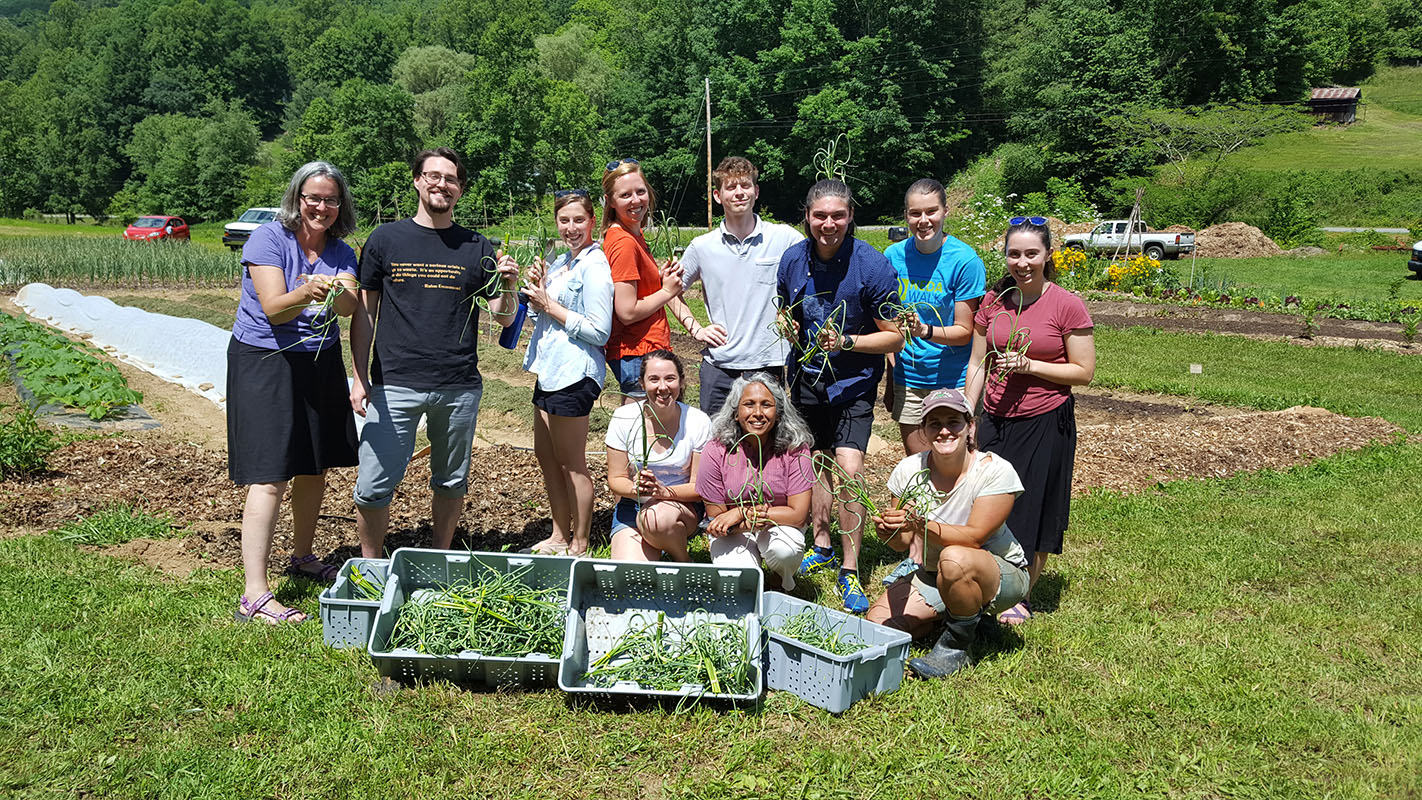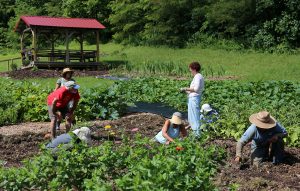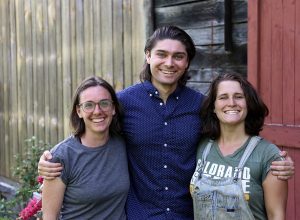MAHEC Interns Dig In to Rural Health with New MPH Program

UNC Asheville graduates join inaugural class of UNC Gillings MPH Program in Asheville
It’s not even 10 a.m. and already the temperature has climbed into the 80s as 10 volunteers fan out to tend a community garden in Yancey County on this warm summer morning.
In one corner, an elderly orchard farmer and her care provider rake up spent garlic beds to make way for winter greens. In another, an AmeriCorps VISTA student rebuilds swales to ensure mountain runoff is channeled to protect and nourish the garden’s vegetables.
A garden manager steps over a row of purple kale in her mud-caked boots, heavy bucket in hand, and pauses to sprinkle bone meal so a retired nurse can amend the soil before planting a new crop. Other volunteers wander through the sprawling candy roasters, pulling back large leaves to estimate how many sugar-sweet pies they’ll be able to bake this fall.
Dig In! Yancey Community Garden, tucked away in the western corner of the state, is one fertile example of a small but rapidly growing movement to end food insecurity in one of the most economically distressed regions in the state.
“We believe that a community farm is something that increases the quality of life in a community and helps provide for everyone’s needs, just like a public library or fire station,” shared Kathleen Wood, Dig In’s executive director and garden manager.
Dig In’s roots date back to 2009, when local potter Linda McFarling and friend John Hartom, both activists for hunger relief, looked at several acres of unused land on McFarling’s property and realized it would make an ideal community garden.
The garden and community support have grown steadily since then. But, so has the need for the fresh food that Dig In makes available every week at Harvest Tables, where community members take what they need to feed their families. Each year, more than 40 kinds of vegetables from Dig In grace these tables and are distributed to four local emergency food programs to ensure community members have access to fresh healthy food. The garden’s vegetable selection is based on local preferences, climate, and their ability to provide maximum nutritional value. Harvest Tables and sharing food are at the heart of Dig In’s community service efforts.
“It was important to Linda and John that the dignity of people be at the center of our services,” Wood explained.
Digging In to Address Public Health Challenges
Community initiatives like Dig In’s are of great interest to public health professionals and students, like Kol Gold-Leighton, a recent UNC Asheville (UNCA) graduate and public health intern at the Mountain Area Health Education Center (MAHEC).

Gold-Leighton’s internship with Dig In this past summer focused on measuring the impact of the garden’s programs in Yancey County. He spent several weeks interviewing key stakeholders and working with UNCA’s Ameena Batada, DrPH, to customize a survey the university had developed for Bounty & Soul, a similar organization based in Black Mountain.
Bounty & Soul provides fresh healthy food, nutrition education, and health and wellness resources to under-resourced communities in Buncombe and McDowell counties. As part of his summer internship, Gold-Leighton also worked with this nonprofit to measure the economic impact of its programs and services.
Gold-Leighton is well aware of the potential impact of programs like those provided by Dig In and Bounty & Soul. As an undergraduate at UNCA, he worked with Amy Lanou, PhD, on a three-year project sponsored by the Appalachian Sustainable Agriculture Project to evaluate the impact of experimental food education on health behavior.
“It was exciting to see people making healthier choices when they had access to cooking and gardening classes and information on where to find fresh local food,” Gold-Leighton shared. “We discovered the biggest changes occurred in people who had never been exposed to this kind of information.”
He had also gained valuable experience through previous UNCA internships, where he worked with the local YWCA to support its after-school healthy cooking programs and its mobile kitchens and market that distribute fresh food along with nutrition education.
“Kol was critical to the process of getting community feedback, because it took time that we didn’t have to be thoughtful about creating this survey,” Wood explained. “He brought a unique skillset to our organization. I would definitely consider working with another public health intern and for much longer!”
Gold-Leighton’s work was important for helping both organizations continue to address some of the most pressing social determinants of health in Western North Carolina (WNC). These social and environmental factors include limited access to healthy food, safe housing, education, economic opportunities, and quality health care, among other things.
“It is estimated that at least 95 percent of community health improvements, such as increases in life expectancy and quality of life, come from public health interventions that address social determinants of health,” explained Travis Johnson, MD, MPH.
Johnson, a family physician and educator at MAHEC, has spent his career serving under-resourced populations. In 2017, he developed a public health internship program at MAHEC that has matched 11 interns from UNCA and UNC Gillings School of Global Public Health with community-based organizations in five Western North Carolina counties.
These interns have worked on a variety of rural health projects involving tribal health, hepatitis C education, transgender health care issues, perinatal substance use treatment services, and regional health data-mapping.
Engaging the Community to Improve Health
One of this summer’s interns, UNCA graduate Kenneth Roche, worked with the North Carolina Center for Health and Wellness to measure the prevalence of adverse childhood events (ACEs) in Buncombe County, which has some of the highest ACEs scores in the state. Roche shared these data with community stakeholders who then developed educational videos featuring local individuals who overcame trauma and discovered their resilience.
“It was overwhelming at times to look at these data,” Roche shared, “and realize that every single data point is a person.”
He hopes that people who have experienced trauma will see these videos and realize that they are not alone, that help is available, and that they can recover with support.
Roche should know. He and his wife recently had to work through the stress of a high-risk pregnancy.
“I’m grateful that everything turned out okay,” he recalled. “The support we received from our health care providers at MAHEC and our community made all the difference. It was incredible to see how these relationships created a better outcome for my family.”
Putting Public Health Leadership into Practice
In addition to guiding MAHEC’s public health internship, Johnson has worked tirelessly over the past two years to bring a new Master of Public Health (MPH) program to Asheville. This program will be led by UNC Gillings, the nation’s top-ranked public school of public health, according to U.S. News & World Report.
“We’re thrilled to have a program of this caliber in Asheville,” shared Jeff Heck, MD, MAHEC’s chief executive officer. “This unique collaboration will train the next generation of public health leaders, who will have a profound impact on our region’s health.”
The Asheville-based MPH program welcomes its first class of students to UNCA’s campus in fall 2018. Johnson serves as the program’s interim director with the support of UNCA’s Batada and Lanou. All three are MPH faculty and teach classes on Fridays. The program will move to its permanent location on the UNC Health Sciences at MAHEC campus when construction is complete in 2019.
Johnson is excited about the program’s place-based approach, real-world learning opportunities, and potential impact.

“We are capturing our students’ passion for Western North Carolina and empowering them with tools to help transform their communities into healthier places to live and work,” Johnson shared. “Our students will be working to improve their communities from day one.”
UNC Gillings’ Leadership in Practice concentration will provide students with the knowledge and skills needed to lead teams, projects, organizations, and systems in addressing health inequities, improving social determinants of health, and fostering community-led change.
Sarah Thach, MPH, a UNC Gillings alumna employed at MAHEC, will help create real-world learning opportunities for MPH students in her role as interim associate director for community partnerships.
“This program addresses a pressing need for public health professionals in our region,” Thach explained. “I’m looking forward to connecting students with local organizations to meet this need.”
Cultivating Change and Healthy Communities
How these students will transform Western North Carolina remains to be seen. But if Gold-Leighton and Roche are any indication, they won’t waste any time. In fact, both will be returning this fall as new MPH students with an even stronger sense of purpose.
Gold-Leighton summed it up nicely. “I want to help initiate the changes that will help our communities grow into the best and most enduring versions of themselves.”
And why not? He definitely learned a thing or two this summer about what makes communities (and community gardens) grow.
If you are interested in learning more about the UNC Gillings MPH Program in Asheville, visit www.mahec.net/publichealth.
